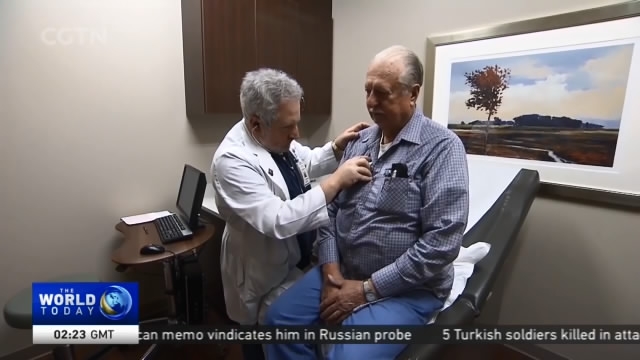
13:22, 04-Feb-2018
World Cancer Day: 1.7 mln Americans expected to be diagnosed with cancer in 2018

Sunday marks World Cancer Day. According to the World Health Organization, cancer is the second leading cause of death worldwide behind heart disease. In 2015, it was responsible for 8.8 million deaths with low and middle-income countries seeing the greatest number of fatalities. The number of new cancer cases is expected to rise about 70 percent over the next 20 years. In the US, the American Cancer Society expects a staggering 1.7 million Americans to be diagnosed with cancer this year and 609,000 will die from it. But morbidity rates have been falling. Karina Huber has more.
Robert Collins was 46 years- old when he found out he had prostate cancer. His family had a history of cancer but not prostate cancer and he had no symptoms. But the former police officer was one of the first responders at the World Trade Center after the September 2001 attacks. Numerous reports have linked 911 dust to cancer.
ROBERT COLLINS CANCER SURVIVOR "I was pretty shocked. When you hear that word 'cancer', it is quite deafening."
His cancer was first discovered by a digital rectal exam - and then confirmed through a biopsy. Three months later he had his entire prostate removed.
ROBERT COLLINS CANCER SURVIVOR "Luckily now, I am a cancer survivor - I don't say survivor - I say thriver."
Every day, 4,700 Americans are diagnosed with cancer. Prostate cancer is most prevalent among men. Among women, it's breast cancer. But mortality rates are falling. Since 1991, cancer deaths in the U.S. are down 26 percent.
The drop is due mainly to fewer people smoking. In the 1950s, roughly 42 percent of U.S. adults smoked. Now it's 15 percent. Tobacco consumption is the leading cause of cancer deaths. But the rates are also falling because of early detection thanks to better methods of screening.
DR. EVA CHALAS, PHYSICIAN DIRECTOR CENTER FOR CANCER CARE, NYU WINTHROP "Early detection is critical and plays a huge role in also how extensive the therapy will be, potentially how much of an impact it will have on that person's function and so on. So early detection cannot be underestimated in its importance."
In the U.S. patients are routinely screened at varying ages for breast, prostate, cervical and colorectal cancers. But Chalas would like to see pre-screening begin much earlier.
DR. EVA CHALAS, PHYSICIAN DIRECTOR CENTER FOR CANCER CARE, NYU WINTHROP "I personally would like to see every newborn genetically tested. With increased genetic profiling, we will identify individuals who are at increased risk and perhaps subject them to screening methodologies earlier so that we can sort of run interference in preventing the cancers from developing. So that's my vision. Obviously, that's not where we are now but I think that will become reality."
KARINA HUBER NEW YORK Leading cancer researchers in the U.K. also want genetic testing to become a part of the standard cancer screening process. They would like to see all women over the age of 30 tested for faulty genes - like the BRCA1 and BRCA2 which can lead to cancer. They predict that would lead to 17,000 fewer ovarian cancers and 64,000 fewer breast cancers in the U.K. Karina Huber, CGTN, New York.

SITEMAP
Copyright © 2018 CGTN. Beijing ICP prepared NO.16065310-3
Copyright © 2018 CGTN. Beijing ICP prepared NO.16065310-3